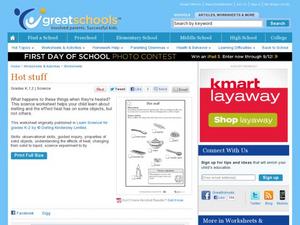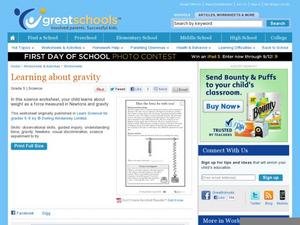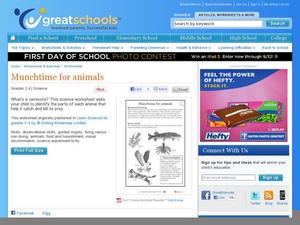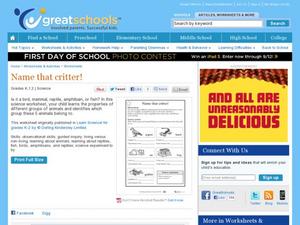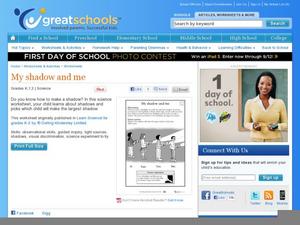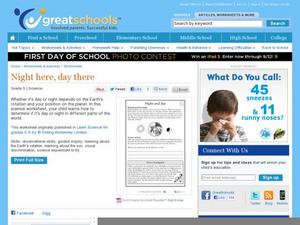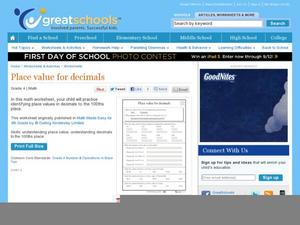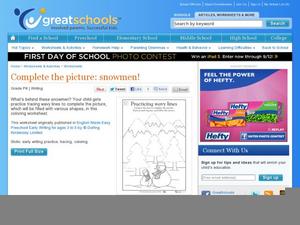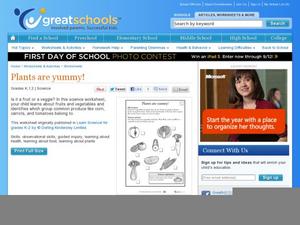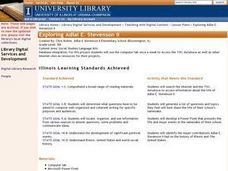Curated OER
Feel the Vibrations
How does sound travel in a string walkie-talkie? Third graders read about the way vibrations act between two cups and a string. Next, they put the steps in order, and experiment with their own walkie-talkies.
Curated OER
Food chains at sea
Fifth graders interpret a table of data about food chains in the ocean. They create a food chain to represent the information on the table. Periwinkles eat seaweed, and crabs eat periwinkles - so who eats crabs? Extend the activity with...
Curated OER
Getting nosy
A nose knows! Connect animals to their noses with a fun science activity. Animals include elephants, rats, pigs, and even humans. For a science exploration, kindergartners answer questions about what they can smell. A great addition to...
Curated OER
Hot Stuff
Very young scientists who are learning about solids, liquids, melting, and freezing will use this worksheet to identify things that would melt if put in a warm place. There are eight objects altogether, and learners place a check mark...
Curated OER
Learning about gravity
Learn how to measure weight with newtons in a science experiment about gravity. After they read a short paragraph about force, fifth graders draw an arrow to indicate which way a spring is being pulled. Next, they survey their family...
Curated OER
Munchtime for animals
Which animals eat meat to stay alive? Third graders group fish, hawks, and cats into carnivores and herbivores. An extended activity prompts kids to cut out magazine pictures of different animals according to the foods that they eat.
Curated OER
Name That Critter
Young learners classify five different animals into their proper category. The animals pictured are a pigeon, a lizard, a cat, a frog, and a goldfish. Pupils are also asked to tell why they know it's a certain kind of animal. An...
Curated OER
My Shadow and Me
Practice making shadows with a kindergarten science experiment. After deciding which picture would represent the biggest shadow, kids use a flashlight to experiment with their own shadows. For extra fun, have kids mark their shadows...
Curated OER
Night Here, Day There
Explore astronomy with a lab sheet for fifth grade scientists. After reading a short explanation about the earth's rotation, they solve a word problem about the differences in times across the world. Next, they make a model of the solar...
Curated OER
Plants have needs, too!
Plants can die if they don't get enough sunlight and water. Kindergartners observe a picture of a hanging plant and grass under a tree, and interpret which each plant has died. Next, they grow watercress seeds in wet cotton to compare...
Curated OER
Ring-A-Ding-Ding!
What sound does metal make when you hit it? Kindergartners and first graders conduct an experiment about the properties of metal. First, they draw a line between metal items and descriptions of each. Next, they use a magnet to see which...
Curated OER
Multiples of 6 #2
Count by six with these helpful activities. After completing number sequences and multiplication problems from the six times table, third graders solve problems that are written out at the bottom of the page. An excellent way to work on...
Curated OER
Place Value for Decimals
Are your fourth graders having problems with decimals? Help them identify the place value of various numbers. Here, they describe what happens to the value of different numbers, as well as select numbers with given values in the tenths...
DK Publishing
Real-Life Problems: Miles, Pounds, and More
Give young arithmeticians an applicable way to use their addition and subtraction skills with these five word problems. Each one presents a scenario requiring they add or subtract numbers with units (money, distance, weight,...
DK Publishing
Subtraction Practice #3
Reinforce subtraction skills with twenty problems, all subtracting two-digit numbers from three-digit numbers. An additional five problems at the end of the page include decimals to the hundredth place. Great as a homework assignment or...
Curated OER
Complete the Picture: Snowmen!
Finish the winter wonderland with your preschoolers. They trace pine trees and the tops of mountains to complete the snowy drawing. Have them color their paper and display the drawings during a winter unit!
Curated OER
Mystery Words - Part Two - School Terms
Students increase their vocabularies with the mystery words activity. In this vocabulary instructional activity, students solve the mystery words using clues.
Curated OER
Food for thought
Cake has to be good for something, right? Different foods are used by our bodies in different ways. Learners will first read about what fats, proteins, fruits, and vegetables do for the human body. They will then put each of food shown...
Curated OER
Magnets are forceful
You could use this worksheet two different ways. As is, or you could have learners actually do the experiment shown. They are to determine which magnet is strongest by counting the number of paper clips hanging from it. Why not get five...
Curated OER
Plants are yummy!
Is it a fruit or a vegetable? Youngsters place an F next to each fruit they see and a V next to the vegetables. Corn is tricky. It is a grass, so it's actually not a fruit or a vegetable, but a grain!
Curated OER
Exploring Adlai E. Stevenson II
Fifth graders research work to research six areas in the life of Adlai E. Stevenson II: His Early life, Governor of Illinois, Campaigns for president, Ambassador to the UN, famous quotes, later years. They create a supply of notecards...
Curated OER
Basics Of Foreign Trade And Exchange
Have your scholars read a handout related to the foreign trade market and how there is an exchange of goods. They read the information as a research assignment and make connections as to how the market fits together.
Curated OER
My Money
Learners identify and interpret the relationships between various components of currency, discusses the uses of money, and provides advanced lessons on making change. They also identify the various ways that money is used and how to use...
Curated OER
Language Arts: Twinning At-Risk Students
Students at-risk in high school and primary grades pair up to read and write together. They create books modeled after authors and illustrators. They hold a parents' day to display their completed books.





